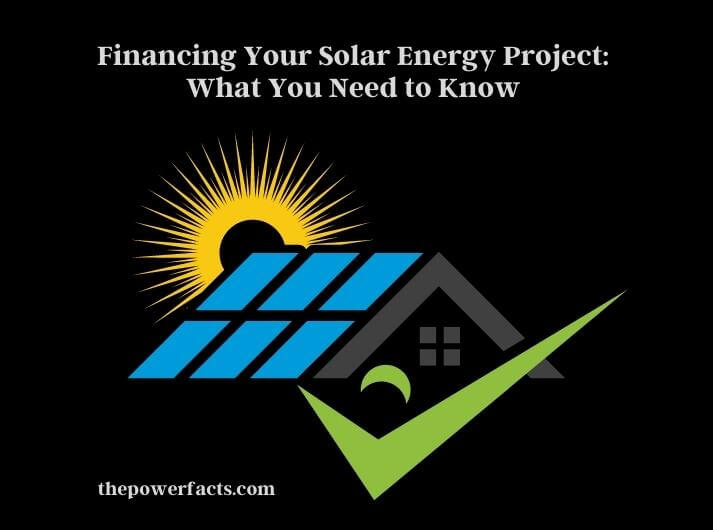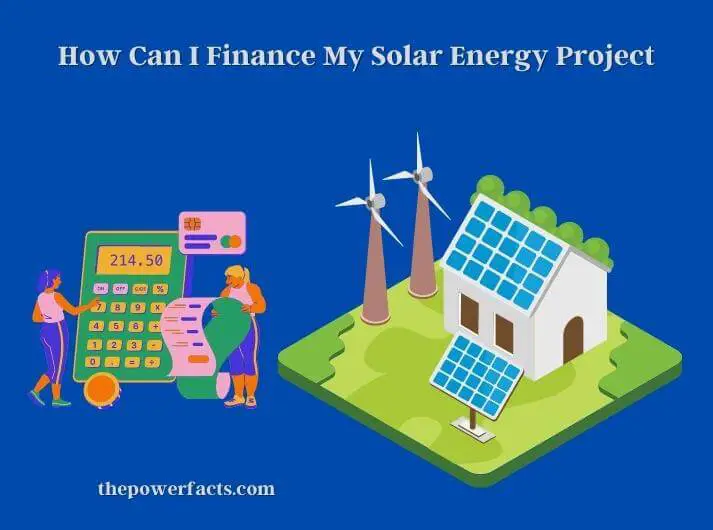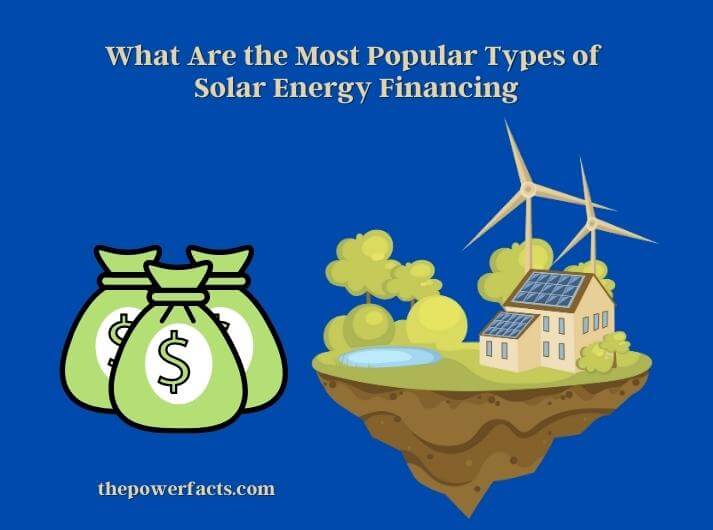Solar energy is a renewable and clean source of energy that has been gaining popularity in recent years. With rising concerns over the environment and increasing energy costs, many homeowners and businesses are turning to solar power to meet their energy needs. One of the biggest challenges of installing a solar energy system is financing it.

With the initial costs of purchasing and installing solar panels and equipment being quite high, many people are hesitant to take the leap. But financing your solar energy project doesn’t have to be overwhelming. With a range of financing options and tax incentives available, it’s possible to make solar energy a reality for your home or business.
How Can I Finance My Solar Energy Project?
When it comes to financing your solar energy project, you have several options to choose from. Understanding the differences between these options can help you make an informed decision that suits your needs and budget. Here are some of the most common financing options:
Cash Purchase
If you have the funds available, purchasing your solar energy system outright can provide the greatest long-term savings. While it requires a significant upfront investment, you’ll own your solar panels and equipment outright, and won’t have to worry about monthly payments or interest charges.
Solar Loans
Many lenders offer specialized loans for solar energy projects, which can help you finance your system at a lower interest rate than traditional loans. With a solar loan, you’ll make monthly payments over a set period of time, typically 10-20 years, and own your solar panels and equipment outright at the end of the loan term.

Power Purchase Agreements (PPAs)
With a PPA, you don’t own the solar panels or equipment, but instead, pay a fixed rate for the energy they produce. This rate is typically lower than what you would pay your utility company for the same amount of energy. PPAs are a good option for those who can’t afford a cash purchase or a loan, but still want to save money on their energy bills.
Leases
Solar leases allow you to rent your solar panels and pay a fixed monthly fee for the energy they produce. While this can be a good option for those who can’t afford a cash purchase or a loan, it can be less cost-effective in the long run. Leases typically last between 10-20 years, and at the end of the lease term, you’ll have the option to purchase the equipment, renew the lease, or have it removed.
What Are the Most Popular Types of Solar Energy Financing?
The most popular types of solar energy financing include cash purchases, solar loans, power purchase agreements (PPAs), and leases. Each of these options has its own benefits and drawbacks, and the right choice for you will depend on your financial situation and goals.
Cash purchases provide the greatest long-term savings, but require a significant upfront investment. Solar loans offer lower interest rates than traditional loans, allowing you to finance your system at a lower cost. PPAs allow you to pay a fixed rate for the energy your solar panels produce, typically lower than what you would pay your utility company for the same amount of energy. Leases provide a low-cost option for those who can’t afford a cash purchase or loan but can be less cost-effective in the long run.

There are also community solar programs, which allow individuals to purchase a share of a solar energy project and receive credits on their energy bill. These programs can be a good option for those who don’t have a suitable location for solar panels or who can’t afford the upfront costs of installing a system.
The most popular type of financing will depend on individual circumstances and priorities. It’s important to consider factors such as your budget, credit score, and long-term financial goals when deciding which option is right for you.
Eligibility for Solar Energy Financing
In order to be eligible for solar energy financing, there are several factors that lenders and financing companies will take into account. Here are some of the key eligibility requirements to consider:
Credit Score
Most solar energy financing options require a credit score of at least 650. However, some lenders may require a higher credit score for certain financing options, such as low-interest solar loans.
Income
Lenders may require a minimum income level in order to qualify for solar energy financing. This helps to ensure that borrowers have the financial resources to make their monthly payments.
Homeownership
If you’re looking to finance a solar energy system for your home, you’ll need to own the property or have a long-term lease agreement.
Location
Some solar financing options may be limited to certain geographic regions, depending on the availability of solar incentives and programs in your area.
Energy Usage
Lenders may consider your average energy usage when determining your eligibility for solar financing. If you have high energy bills, you may be a more attractive candidate for financing, as you stand to save more money on your energy bills with a solar energy system.
Note
It’s important to note that eligibility requirements can vary depending on the financing option you choose. Some options, such as cash purchases or community solar programs, may have more flexible eligibility requirements than solar loans or leases. It’s also worth exploring any local or state-specific solar incentives or programs that may be available, as these can help offset the costs of your solar energy project and make financing more accessible. By doing your research and comparing your options, you can find the financing solution that works best for you and your solar energy goals.
Choosing the Right Financing Option
Choosing the right financing option for your solar energy project is an important decision that can impact your long-term savings and overall financial goals. Here are some key factors to consider when evaluating your financing options:
Cost: Consider the upfront cost of each financing option, as well as the long-term costs over the life of your solar energy system. A cash purchase will typically provide the greatest long-term savings but may require a significant upfront investment. A solar loan or lease, on the other hand, may have lower upfront costs but higher interest rates or monthly payments over time.
Payment Structure: Consider the payment structure of each financing option, including the interest rate, monthly payment amount, and the repayment period. A solar loan may offer a fixed or variable interest rate, while a lease may provide a fixed monthly payment for the duration of the lease term.
Ownership: Consider whether you want to own your solar energy system outright, or if you’re comfortable leasing the system from a third-party provider. Owning your system provides the greatest long-term savings and control over your energy production, but may require a larger upfront investment.
Incentives: Be sure to factor in any local, state, or federal incentives that may be available for your solar energy project. These incentives can help offset the upfront cost of your system and make financing more affordable.
Long-Term Goals: Consider your long-term financial goals, including how long you plan to stay in your home and how much you value energy independence and sustainability. A cash purchase or solar loan may provide greater long-term savings and energy independence, while a lease or power purchase agreement may offer a more affordable short-term solution.
Applying for Solar Energy Financing
Once you have decided on the right financing option for your solar energy project, it’s time to begin the application process. Here are the steps to apply for solar energy financing:
Gather Information
Before you start your application, gather all necessary information, including your credit score, income, energy usage, and any relevant property information. You may also need to provide documentation, such as tax returns, bank statements, or proof of homeownership.
Research Lenders
Research potential lenders or financing companies that offer the financing option you have chosen. Look for reviews, interest rates, and other terms and conditions to ensure you’re getting the best deal.
Submit an Application
Once you have chosen a lender or financing company, submit an application with all the necessary information and documentation. This may include filling out an online application, submitting paperwork by mail or email, or speaking with a representative over the phone.
Await Approval
Once your application is submitted, the lender or financing company will review your information and determine whether you are eligible for financing. This process may take a few days to a few weeks, depending on the financing option and lender.
Sign Agreement
If you are approved for financing, you will need to sign a financing agreement outlining the terms and conditions of your loan or lease. This agreement will include information such as interest rates, monthly payments, repayment periods, and any other relevant details.
Install Solar Energy System
Once your financing is in place, you can move forward with installing your solar energy system. Be sure to work with a reputable solar energy provider who can install your system to industry standards and help you take advantage of any available solar incentives and programs.
Wrapping Up a Conclusion
Financing your solar energy project is an important consideration when embarking on a project of this nature. With several options available, including solar loans, home equity loans, PPAs, solar leases, and PACE financing, it’s important to choose the option that best suits your financial goals and needs.
When considering financing options, it’s also important to keep in mind the potential savings on your energy bills and any tax incentives or rebates that may be available. And for commercial solar energy projects, there are specific financing options and incentives available to businesses that can help make the project more affordable and financially viable.
With the right financing in place, you can move forward with your solar energy project with confidence, knowing that you are making a wise investment in both your financial future and the future of our planet.
If you want to best battery for a winch, click here for this.
Common Questions & Response
Do I Need to Have Good Credit to Finance a Solar Energy System?
While having good credit can certainly help you secure a loan or lease for your solar energy system, it is not always necessary. Many lenders offer loans specifically for solar energy projects, which can be a good option for those with less-than-perfect credit.
What Tax Incentives Are Available for Solar Energy Projects?
There are several tax incentives available for solar energy projects, including the Federal Solar Tax Credit, also known as the Investment Tax Credit (ITC), and state-level incentives such as property tax exemptions and sales tax exemptions. These incentives can help offset the upfront cost of a solar energy system and make financing more affordable.
What Documentation Do I Need to Apply for Solar Energy Financing?
When applying for solar energy financing, you will need to provide various documentation to the lender or financing company. The exact documentation requirements may vary depending on the financing option and the lender’s policies, but typically you will need to provide information on your credit score, income, and energy usage.
You may also need to provide documentation such as tax returns, bank statements, proof of homeownership or property ownership, and information on the solar energy system you plan to install. Some lenders may require a site visit to assess the property and the viability of the solar energy system. It’s important to gather all necessary documentation ahead of time to ensure a smooth application process.
Can I Get Financing for a Commercial Solar Energy Project?
Yes, financing options are available for commercial solar energy projects. In fact, there are specific financing options tailored to the needs of businesses, such as Commercial Property Assessed Clean Energy (C-PACE) financing. This financing option allows businesses to finance the installation of energy-efficient upgrades, including solar energy systems, through their property taxes.
Another option is to seek out a commercial solar loan or lease, which may have different requirements and interest rates compared to residential options. Many lenders offer customized financing solutions for businesses, including the option to spread out payments over several years to better align with cash flow.